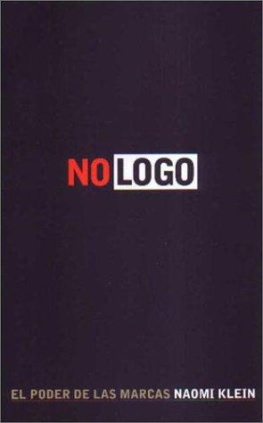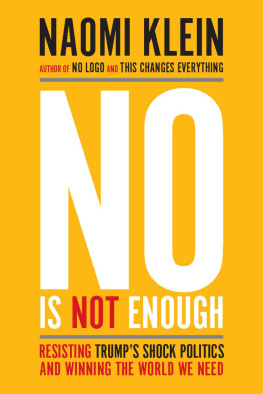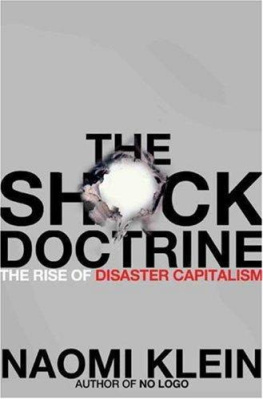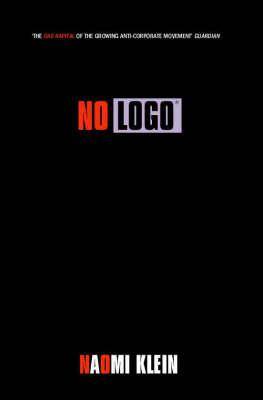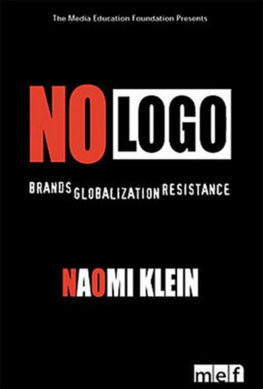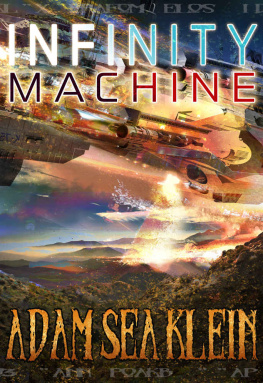Naomi Klein - No LOGO
Here you can read online Naomi Klein - No LOGO full text of the book (entire story) in english for free. Download pdf and epub, get meaning, cover and reviews about this ebook. year: 2001, publisher: Paidc, genre: Romance novel. Description of the work, (preface) as well as reviews are available. Best literature library LitArk.com created for fans of good reading and offers a wide selection of genres:
Romance novel
Science fiction
Adventure
Detective
Science
History
Home and family
Prose
Art
Politics
Computer
Non-fiction
Religion
Business
Children
Humor
Choose a favorite category and find really read worthwhile books. Enjoy immersion in the world of imagination, feel the emotions of the characters or learn something new for yourself, make an fascinating discovery.
- Book:No LOGO
- Author:
- Publisher:Paidc
- Genre:
- Year:2001
- Rating:4 / 5
- Favourites:Add to favourites
- Your mark:
- 80
- 1
- 2
- 3
- 4
- 5
No LOGO: summary, description and annotation
We offer to read an annotation, description, summary or preface (depends on what the author of the book "No LOGO" wrote himself). If you haven't found the necessary information about the book — write in the comments, we will try to find it.
No LOGO — read online for free the complete book (whole text) full work
Below is the text of the book, divided by pages. System saving the place of the last page read, allows you to conveniently read the book "No LOGO" online for free, without having to search again every time where you left off. Put a bookmark, and you can go to the page where you finished reading at any time.
Font size:
Interval:
Bookmark:

Naomi Klein is an award-winning journalist, author and filmmaker. Her most recent book, The Shock Doctrine: The Rise of Disaster Capitalism , was a New York Times and number-one international bestseller; it is being translated into twenty-seven languages. She writes an internationally syndicated column for The Nation and The Guardian (UK), is a contributing editor at Harpers and a reporter for Rolling Stone . In 2004, she released The Take , a feature documentary about Argentinas occupied factories, coproduced with director Avi Lewis. She is a former Miliband Fellow at the London School of Economics and holds an honorary Doctor of Civil Law degree from the University of Kings College, Nova Scotia.
www.naomiklein.org
Praise for No Logo
Klein is a gifted writer; her paragraphs can be as seductive as the ad campaigns she dissects.
The New York Times Book Review
Energetic and optimistic, Ms. Klein incarnates [her] generations invention of the North American left.
The New York Times
Klein is a sharp cultural critic and a flawless storyteller. Her analysis is thorough and thoroughly engaging.
Newsweek.com
Nothing short of a complete, user-friendly handbook on the negative effects that 90s uberbrand marketing has had on culture, work and consumer choiceAn encyclopedic compilation of the decades fringe and mainstream anti-corporate actions and mindsets.
The Village Voice
What corporations fear most are consumers who ask questions. Naomi Klein offers us the arguments with which to take on the superbrands.
Billy Bragg
Just when you thought multinationals and crazed consumerism were too big to fight, along comes Naomi Klein with facts, spirit and news of successful fighters already out there. No Logo is an invigorating call to arms for everybody who wants to save money, justice or the universe.
Gloria Steinem
Naomi Kleins trenchant book is the perfect introduction to and explanation of those stunning events [in Seattle]. This book is the very essence of cool.
The Globe and Mail (Toronto)
To understand how branding drives the global market, you couldnt ask for a better guide than Naomi Klein.
The Toronto Star
A powerful and passionate book.
National Post (Canada)
No Logo has been a word-of-mouth sensation, giving voice to a generation of people under thirty who have never related to politics until now. The band Radiohead were so inspired by No Logo that they have banned corporate advertising from their British tour, deeming all venues logo free. Naomi Klein might just be helping to reinvent politics for a new generation.
The Guardian (UK)
The Das Kapital of the growing anti-corporate movement.
The Observer (London)
A brilliant account of how Nike, Starbucks, McDonalds, etc., branded the industrialized world, and how the most exciting strand of radical politics is now bound up with resisting their kulturkampf Fantastic and inspiring.
The Times Literary Supplement (London)
A brilliant book.
The Times (London)
This entertaining exposure of corporate culture resonates with disillusion.
The Independent (UK)
A riveting, conscientious piece of journalism and a strident call to arms. Packed with enlightening statistics and extraordinary anecdotal evidence, No Logo is fluent, undogmatically alive to its contradictions and omissions and positively seethes with intelligent anger.
The Observer (London)
If the world really is just one big global village, then the logo is its common language understood byif not accessible toeveryone. In No Logo , Klein undertakes an arduous journey to the center of a post-national planet. Starting with the brands birth, as a means of bringing soul to mass marketing, she follows in the logos wake and notes its increasing capacity for making the product subservient. Beyond this she reaches her core argumentthe now uneasy struggle between corporate power and anti-corporate activismvia sweatshop labor, submerged identity, and subversive action. Part sociological thesis, part design history, No Logo is entirely engrossing and empathetic.
GQ (UK)

For Avi
You might not see things yet on the surface, but underground, its already on fire .
Indonesian writer Y.B. Mangunwijaya, July 16, 1998Contents

No Logo at Ten
As I write this introduction, thinking about how much branding has changed in ten years, a couple of developments seem worth mentioning off the top. In May of 2009, Absolut Vodka launched a limited-edition line called Absolut No Label. The companys global public relations manager Kristina Hagbard explains that, for the first time we dare to face the world completely naked. We launch a bottle with no label and no logo, to manifest the idea that no matter whats on the outside, its the inside that really matters. We encourage people to think twice about their prejudice, because in an Absolut world, there are no labels.
A few months later, Starbucks tried to avoid being judged by its own label by opening its first unbranded coffee shop in Seattle, called 15th Avenue E Coffee and Tea. This stealth Starbucks (as the anomalous outlet immediately became known) was decorated with one-of-a-kind fixtures and customers were invited to bring in their own music for the stereo system as well as their own pet social causesall to help develop what the company called a community personality. Customers had to look hard to find the small print on the menus: inspired by Starbucks. Tim Pfeiffer, a Starbucks senior vice president, explained that unlike the ordinary Starbucks outlet that used to occupy the very same piece of retail space, This one is definitely a little neighborhood coffee shop. After spending two decades blasting its logo onto 16,000 stores worldwide, Starbucks was now trying to escape its own brand.
Clearly the techniques of branding have both thrived and adapted since I published No Logo . But in the past ten years I have written very little about developments like these. I realized why while reading William Gibsons 2003 novel Pattern Recognition . The books protagonist, Cayce Pollard, is allergic to brands, particularly Tommy Hilfiger and the Michelin Man. So strong is this morbid and sometimes violent reactivity to the semiotics of the marketplace that she has the buttons on her Levis jeans ground smooth so that there are no corporate markings. When I read those words, I immediately realized that I had a similar affliction. It was not one of those conditions that you are born with but one that develops, over time, due to prolonged overexposure. I didnt used to be allergic to brands. As I confess in the pages of this book, as a child and teenager I was almost obsessively drawn to them. But writing No Logo required four years of total immersion in ad culturefour years of watching and rewatching Super Bowl ads, scouring Advertising Age for the latest innovations in corporate synergy, reading soul-destroying business books on how to get in touch with your personal brand values, attending corporate seminars on brand management, making excursions to Niketowns, to monster malls, to branded towns. And watching some of the worst movies ever made while taking notes in the dark on product placement.
Some of it was fun. But by the end, it was as if I had passed some kind of threshold and, like Cayce, I developed something close to a brand allergy. Brands lost most of their charm for me, which was handy because once No Logo was a bestseller, even drinking a Diet Coke in public could land me in the gossip column of my hometown newspaper.
Font size:
Interval:
Bookmark:
Similar books «No LOGO»
Look at similar books to No LOGO. We have selected literature similar in name and meaning in the hope of providing readers with more options to find new, interesting, not yet read works.
Discussion, reviews of the book No LOGO and just readers' own opinions. Leave your comments, write what you think about the work, its meaning or the main characters. Specify what exactly you liked and what you didn't like, and why you think so.

